Photographs: Reuters M R Venkatesh
It is one issue that has consistently left me in complete contemplation. At the very end of Ramayana when Lord Ram was fighting Ravan, the Devas and Gandharvas too gathered to watch the epic battle. 'Jai Ho,' my teacher pointed out, was their call, without actually taking sides. And only after Ravan fell, it was 'Jai Shri Ram.'
Indian middle class perfectly mirrored this behaviour of the Devas and Gandharvas in Ramayana. It has always given a clarion call of 'Jai ho' in India's fight against corruption, without actually being seen taking sides.
That was till the first week of April. And when the middle class began throwing its weight behind Anna Hazare, the government instantly knew that it was game, set and match for Anna.
Crucially the government got the message: the middle class was getting increasingly impatient in the fight against corruption.
. . .
Corruption: Heavy punishment needed, not Lok Pal
Photographs: Reuters
Sensing the mood of the nation the government relented. May be it is a strategic retreat. For a government that is reeling under continuing allegations of corruption, this movement had to be diffused, derailed or better still, discredited.
For this, it required time to regroup, plan and hit back.
This is where the organisers were at their unprepared worst. While one must concede that, Anna's fast was brilliantly timed -- after the ICC Cricket World Cup and before the commencement of Indian Premier League cricket matches.
Nevertheless, one must also hasten to add that, the organisers did not have any long-term strategy of understanding how the Congress or our government works.
. . .
Corruption: Heavy punishment needed, not Lok Pal
Photographs: Reuters
Naturally, when the government agreed to the formation of a joint drafting committee, it had a definite plan and strategy.
First, it instantly took the fizz out of the corruption movement.
Secondly, it gave enough time to the vested interests to launch a savage attack on the organisers.
Finally, given the track record of the Congress (remember the promise to create the State of Telangana and only to renege on the promise) on reneging on its promises, one can be certain of some further nasty surprises in the days to come.
. . .
Corruption: Heavy punishment needed, not Lok Pal
This is where the civil society missed a trick or two. When the fast was on, the government was on a weak wicket. Ideally, Anna should have continued to pile on the pressure on the government and if need be threaten to continue his fast.
After the first round of success, he should have changed the goal post and made a few more demands.
For instance, given the mood of the nation, Anna could have demanded that the government should reveal the names of those Indians who are alleged to have held accounts in a Liechtenstein bank.
It may be recalled that the government has admittedly received a CD from Germany purporting to contain the names of some prominent Indians who hold accounts in the Liechtenstein bank and is reluctant to reveal its contents.
. . .
Corruption: Heavy punishment needed, not Lok Pal
Similarly, pressure could have been increased on the government to ensure that the government announces an action plan on how it proposes to bring back our looted wealth from various tax havens.
The six paragraphs devoted to the issue of black money in Finance Minister Pranab Mukherjee's Budget Speech on February 28, 2011 in Parliament, has not impressed many. A more detailed plan of action could have been demanded.
Joint Drafting Committee is Pyrrhic victory
And if the government relented to any one or all of these demands it could have been seen as a government that was buckling under the pressure of public opinion.
And if the government did not concede, it would have turned the opinion of the people against it. To me that too could be considered as victory.
. . .
Corruption: Heavy punishment needed, not Lok Pal
Little did the organisers realise that mass movements are not carried out with singular goalposts or limited agendas: they are carried out with several and one needs to constantly shift goalposts till the final 'goal' is reached.
And when the organisers had the government by the scruff of its neck, they should have gone in for the jugular.
Strangely, the civil society despite the overwhelming public and media attention and backing agreed to a limited agenda for the setting up of a mere joint drafting committee.
What is interesting to note here is that, barring Anna Hazare and Arvind Kejriwal, all the other eight members of the joint drafting committee are lawyers. Naturally, being lawyers, this group even in the best of circumstances can endlessly debate on the semantics of the legislation -- not on fighting corruption.
. . .
Corruption: Heavy punishment needed, not Lok Pal
Eight lawyers can very easily translate into a billion opinions.
And given the track record of some representing the government side (where they have refused to see the points of view of some of their own party colleagues), it would be puerile to expect a draft legislation agreeable to all within the time frame agreed by the parties.
But that is a worst case scenario. The best case scenario, I am afraid, will be no better. At best, we will pass a Lok Pal Bill, set offices of Lok Pal across the country and appoint officers 'from within the system' to man this institution.
All this will be done with great expectations, fervour and enthusiasm. But all these will be dynamited from within, brazenly and without any let or fear by our political parties across the political spectrum (pun unintended), of course, aided and abetted by our bureaucracy.
. . .
Corruption: Heavy punishment needed, not Lok Pal
I may sound cynical, but my cynicism is not misplaced. Remember a decade back we got the Central Vigilance Commission with great fanfare, expectation and promise. Sadly, the CVC has degenerated into nothingness today.
And lest the reader accuse me of being partial towards the CVC, let me hasten to add that our polity has systematically defanged every constitutional institution, barring honourable exceptions.
Whatever be the integrity of the Lok Pal and the fail-proof method of appointing the Lok Pal by first setting an elite committee, political parties and those in the bureaucracy will not be perturbed.
They know pretty well whatever be the integrity of the Lok Pal, all that needs to be done is to manage the officers manning the office of the Lok Pal, create bureaucratic hurdles and of course neutralise it . . . so much so, that it would be reduced to another toothless watchdog sooner than later.
. . .
Corruption: Heavy punishment needed, not Lok Pal
In short, the setting up of the joint drafting committee is at best a pyrrhic victory for the civil society
Well legislated, badly governed
To appreciate what has been stated above, a reference to the recent events in the country would be in order. Let us not forget that the 2G spectrum scam was a result of a tacit understanding between a pliant bureaucracy and their political masters.
Beginning from a high level secretary to low ranking officers in the telecom ministry, anyone could have prevented this loot. Yet no one did move his or her little finger to prevent the loot.
Ditto with the CWG scam as it is with several others. What is even more depressing is the quiet burial given to the Antrix deal, especially when professional administrators were involved in the alleged scam.
. . .
Corruption: Heavy punishment needed, not Lok Pal
Whatever be the compelling reasons, given the checks and balances embedded in our system, it is impossible to believe that several of our watchdogs within the system have failed to raise an alarm, not once or twice, but with unfailing regularity in the run up to these scams.
And yet we are going to trust a few of these watchdogs to go over and man the office of the Lok Pal!
Given this paradigm it is difficult to believe that the Lok Pal would fight corruption, little realising that many State actors in India are the beneficiaries of the system that allows rampant corruption.
This is akin to the belief entertained in some quarters that the Pakistani government would join the global war on terror. How could the State actors in Pakistan direct the Pakistani government or its agencies to fight terror when they -- the State actors in Pakistan -- are direct beneficiaries of such terror?
. . .
Corruption: Heavy punishment needed, not Lok Pal
Photographs: Reuters
Simply put, the fight against corruption in India cannot be left to an institution manned by a handful of officers from the government despite a Lok Pal of impeachable integrity.
The system is quite adept, well-trained and has an exemplary track record of neutralising such situations.
Appointing the Lok Pal is a small but definitive step. But the civil society needs to apply constant pressure. For instance, disclosing the names contained in the Liechtenstein bank CD could be a good starting point.
Similarly, pressure must be built on all those watchdogs that refused to bark in the 2G, CWG or for that matter the Antrix scams.
. . .
Corruption: Heavy punishment needed, not Lok Pal
Photographs: Reuters
Those guilty of failing to perform their role as watchdogs in the recent scams should be charged with criminal negligence of their duties and tried for abetment along with those guilty.
Sadly we are not focussing enough on this dimension. Interestingly, all these are possible under the extant laws and even before we legislate the Lok Pal Bill. And that to me is the crux of the issue.
The problem in India is that we are excessively legislated and badly governed. We have a dismal track record of felling our own institutions.
My fear is that Lok Pal will be the next on the list of institutions that will be rendered impotent by a ruthlessly efficient polity that makes even Machiavelli look like a primary school kid.
. . .
Corruption: Heavy punishment needed, not Lok Pal
Photographs: Reuters
If we can somehow manage to punish some of our guilty, we can win the war on corruption. Else our polity will somehow manage to corrupt the office of the Lok Pal too.
To me the Criminal Procedure Code, the Evidence Act, the Prevention of Corruption Act as well as the existing legal architecture are more than sufficient to punish the guilty.
What we lack is political will. How will the Lok Pal deal with this fundamental issue?
The author is a Chennai-based Chartered Accountant. He can be contacted at mrv@mrv.net.in

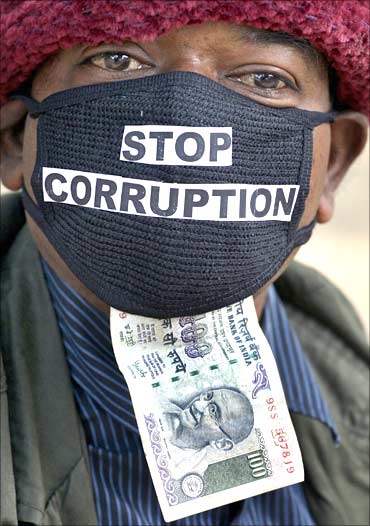
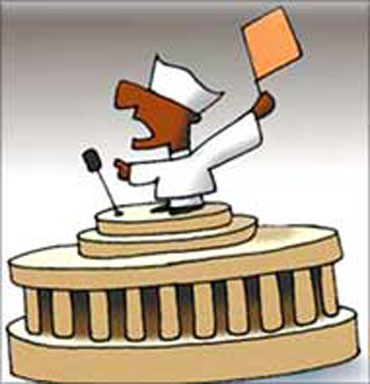

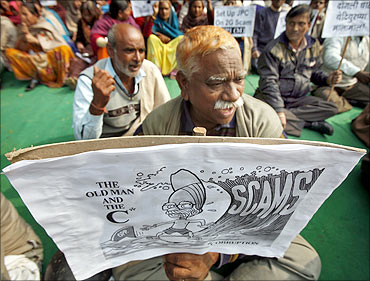

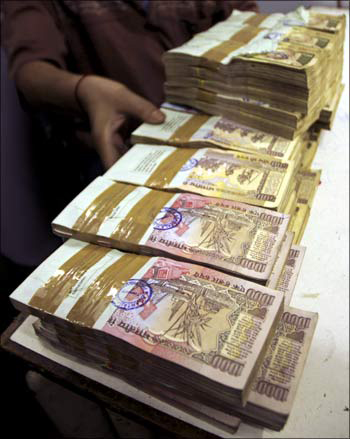
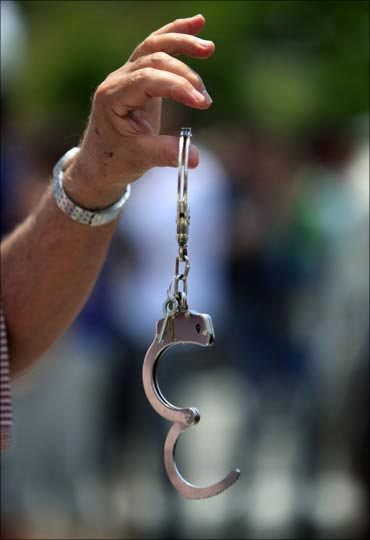

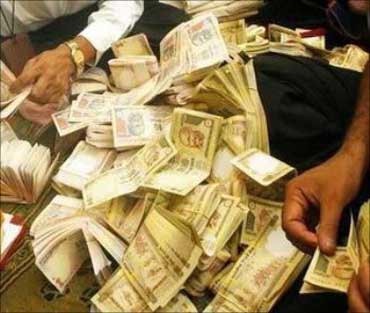
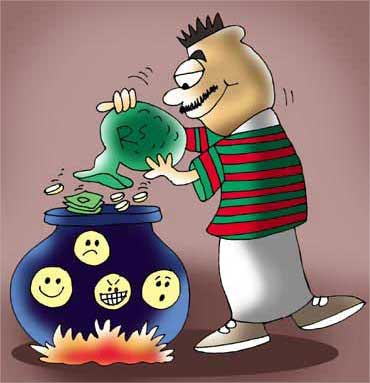



article